英语单词辨析
英语必修一单词词义辨析

英语必修一单词词义辨析在英语学习过程中,经常会遇到一些容易混淆的单词,它们可能在拼写上略有不同,但在实际应用中却有着截然不同的含义。
正确理解并区分这些单词的意思,对提高语言表达准确性至关重要。
因此,本文将从以下几个方面进行对比解析。
1. Advice 和 Advise这两个单词在拼写上只有一个字母的区别,但含义却完全不同。
"Advice" 是名词,意为建议或劝告;而"Advise" 是动词,意为给予建议或劝告。
例如:I need some advice on how to deal with this situation.(我需要一些建议来处理这种情况。
)2. Affect 和 Effect"Affect" 是动词,意为影响;而"Effect" 则是名词,意为结果或效果。
例如:The new policy will affect all employees.(新政策将影响所有员工。
)The new policy had a positive effect on the company's performance.(新政策对公司的业绩产生了积极影响。
)3. Principal 和 Principle"Principal" 作为名词时指学校的负责人,或者原则、主要的事物;而"Principle" 则是名词,指原则或准则。
例如:The principal of the school announced the new rule.(学校的校长宣布了新规定。
)We should stick to our principles no matter what.(无论发生什么事情,我们都应该坚持自己的原则。
)4. Accept 和 Except"Accept" 是动词,意为接受;而"Except" 则是介词,意为除了…之外。
英语常用词语辨析
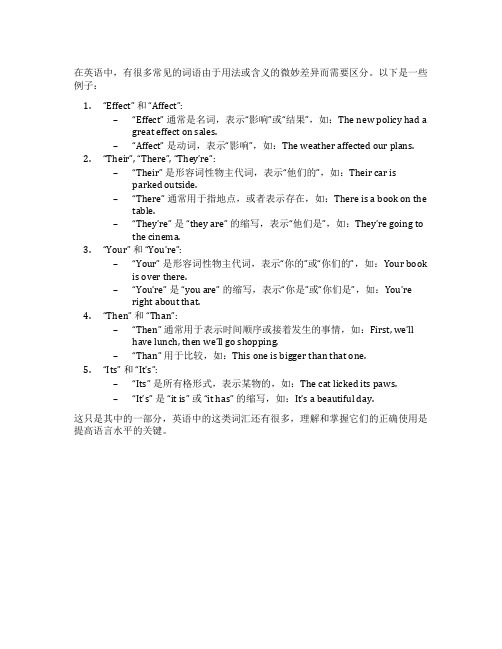
在英语中,有很多常见的词语由于用法或含义的微妙差异而需要区分。
以下是一些例子:1.“Effect” 和“Affect”:–“Effect” 通常是名词,表示“影响”或“结果”,如:The new policy had a great effect on sales.–“Affect” 是动词,表示“影响”,如:The weather affected our plans. 2.“Their”, “There”, “They’re”:–“Their” 是形容词性物主代词,表示“他们的”,如:Their car isparked outside.–“There” 通常用于指地点,或者表示存在,如:There is a book on the table.–“They’re” 是“they are” 的缩写,表示“他们是”,如:They’re going to the cinema.3.“Your” 和“You’re”:–“Your” 是形容词性物主代词,表示“你的”或“你们的”,如:Your book is over there.–“You’re” 是“you are” 的缩写,表示“你是”或“你们是”,如:You’re right about that.4.“Then” 和“Than”:–“Then” 通常用于表示时间顺序或接着发生的事情,如:First, we’ll have lunch, then we’ll go shopping.–“Than” 用于比较,如:This one is bigger than that one.5.“Its” 和“It’s”:–“Its” 是所有格形式,表示某物的,如:The cat licked its paws.–“It’s” 是“it is” 或“it has” 的缩写,如:It’s a beautiful day.这只是其中的一部分,英语中的这类词汇还有很多,理解和掌握它们的正确使用是提高语言水平的关键。
最新英语单词辨析大全
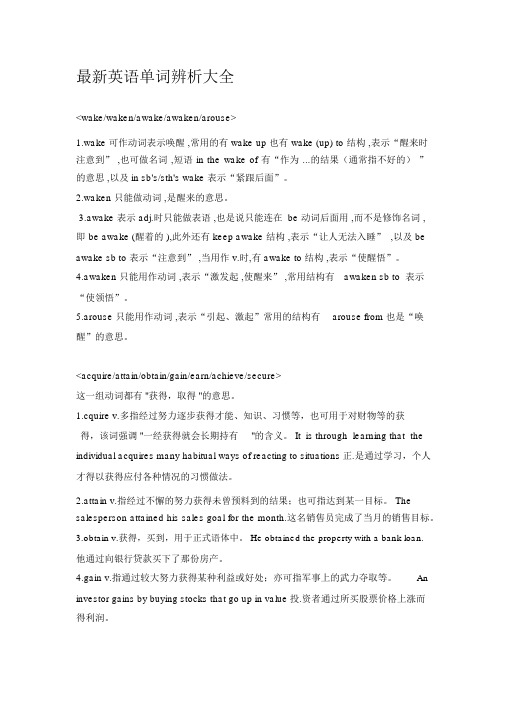
最新英语单词辨析大全<wake/waken/awake/awaken/arouse>1.wake 可作动词表示唤醒 ,常用的有 wake up 也有 wake (up) to 结构 ,表示“醒来时注意到” ,也可做名词 ,短语 in the wake of 有“作为 ...的结果(通常指不好的)”的意思 ,以及 in sb's/sth's wake 表示“紧跟后面”。
2.waken 只能做动词 ,是醒来的意思。
3.awake 表示 adj.时只能做表语 ,也是说只能连在be 动词后面用 ,而不是修饰名词 ,即be awake (醒着的 ),此外还有 keep awake 结构 ,表示“让人无法入睡” ,以及 be awake sb to 表示“注意到” ,当用作 v.时,有 awake to 结构 ,表示“使醒悟”。
4.awaken 只能用作动词 ,表示“激发起 ,使醒来” ,常用结构有awaken sb to 表示“使领悟”。
5.arouse 只能用作动词 ,表示“引起、激起”常用的结构有arouse from 也是“唤醒”的意思。
<acquire/attain/obtain/gain/earn/achieve/secure>这一组动词都有 "获得,取得 "的意思。
1.cquire v.多指经过努力逐步获得才能、知识、习惯等,也可用于对财物等的获得,该词强调 "一经获得就会长期持有"的含义。
It is through learning that the individual acquires many habitual ways of reacting to situations正.是通过学习,个人才得以获得应付各种情况的习惯做法。
2.attain v.指经过不懈的努力获得未曾预料到的结果;也可指达到某一目标。
The salesperson attained his sales goal for the month.这名销售员完成了当月的销售目标。
英语常用单词词义辨析
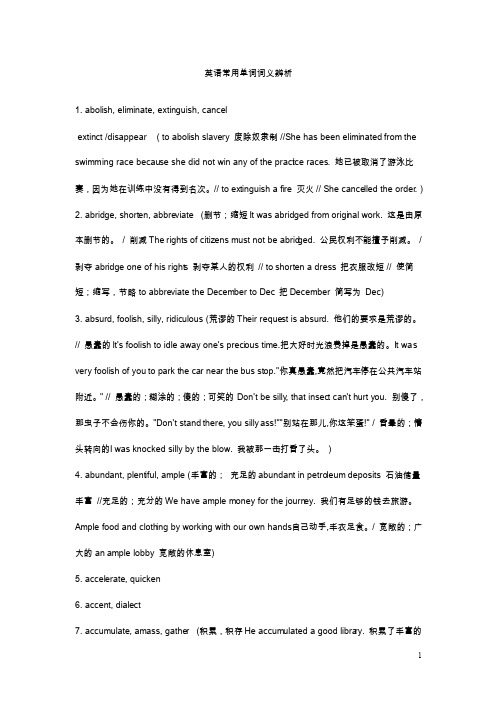
英语常用单词词义辨析1. abolis h, elimin ate, exting uish, cancelextinc t /disapp ear (to abolis h slaver y 废除奴隶制//She has been elimin atedfrom the swimmi ng race becaus e she did not win any of the practi ce races.她已被取消了游泳比赛,因为她在训练中没有得到名次。
// to exting uisha fire 灭火 // She cancel led the order.)2. abridg e, shorte n, abbrev iate(删节;缩短It was abridg ed from origin al work. 这是由原本删节的。
/ 削减Therights of citize ns must not be abridg ed. 公民权利不能擅予削减。
/ 剥夺abri dge one of his rights剥夺某人的权利// to shorte n a dress把衣服改短// 使简短;缩写,节略to abbrev iatethe Decemb er to Dec 把Decem ber 简写为Dec)3. absurd, foolis h, silly, ridicu lous(荒谬的The ir reques t is absurd. 他们的要求是荒谬的。
// 愚蠢的It's foolis h to idle away one's precio us time.把大好时光浪费掉是愚蠢的。
It was very foolis h of you to park the car near the bus stop."你真愚蠢,竟然把汽车停在公共汽车站附近。
常见英语单词易混淆辨析
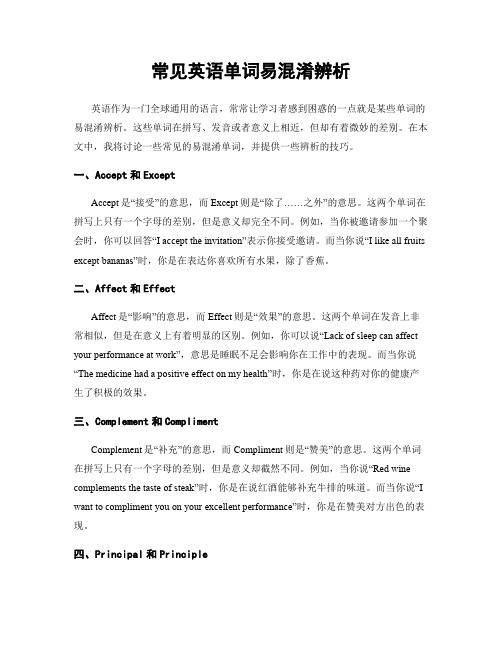
常见英语单词易混淆辨析英语作为一门全球通用的语言,常常让学习者感到困惑的一点就是某些单词的易混淆辨析。
这些单词在拼写、发音或者意义上相近,但却有着微妙的差别。
在本文中,我将讨论一些常见的易混淆单词,并提供一些辨析的技巧。
一、Accept和ExceptAccept是“接受”的意思,而Except则是“除了……之外”的意思。
这两个单词在拼写上只有一个字母的差别,但是意义却完全不同。
例如,当你被邀请参加一个聚会时,你可以回答“I accept the invitation”表示你接受邀请。
而当你说“I like all fruits except bananas”时,你是在表达你喜欢所有水果,除了香蕉。
二、Affect和EffectAffect是“影响”的意思,而Effect则是“效果”的意思。
这两个单词在发音上非常相似,但是在意义上有着明显的区别。
例如,你可以说“Lack of sleep can affect your performance at work”,意思是睡眠不足会影响你在工作中的表现。
而当你说“The medicine had a positive effect on my health”时,你是在说这种药对你的健康产生了积极的效果。
三、Complement和ComplimentComplement是“补充”的意思,而Compliment则是“赞美”的意思。
这两个单词在拼写上只有一个字母的差别,但是意义却截然不同。
例如,当你说“Red wine complements the taste of steak”时,你是在说红酒能够补充牛排的味道。
而当你说“I want to compliment you on your excellent performance”时,你是在赞美对方出色的表现。
四、Principal和PrinciplePrincipal是“校长”的意思,而Principle则是“原则”的意思。
英语易混淆单词辨析知识讲解
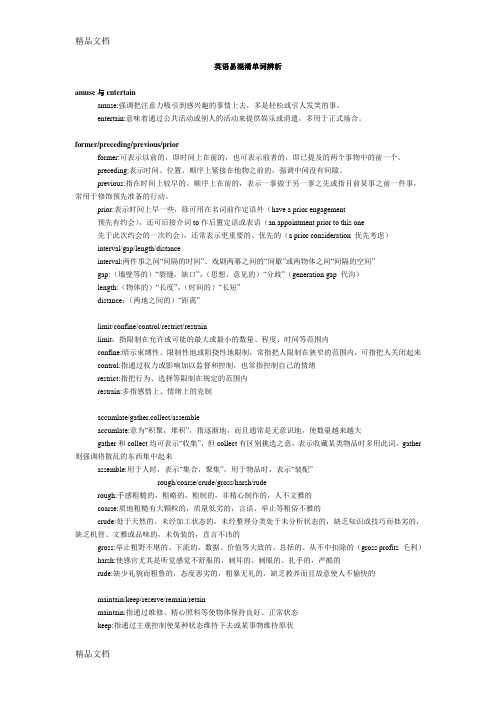
英语易混淆单词辨析amuse与entertainamuse:强调把注意力吸引到感兴趣的事情上去,多是轻松或引人发笑的事。
entertain:意味着通过公共活动或别人的活动来提供娱乐或消遣,多用于正式场合。
former/preceding/previous/priorformer:可表示以前的,即时间上在前的,也可表示前者的,即已提及的两个事物中的前一个。
preceding:表示时间、位置、顺序上紧接在他物之前的,强调中间没有间隙。
previous:指在时间上较早的、顺序上在前的,表示一事做于另一事之先或指目前某事之前一件事,常用于修饰预先准备的行动。
prior:表示时间上早一些,除可用在名词前作定语外(have a prior engagement预先有约会),还可后接介词to作后置定语或表语(an appointment prior to this one先于此次约会的一次约会),还常表示更重要的、优先的(a prior consideration 优先考虑)interval/gap/length/distanceinterval:两件事之间“间隔的时间”、戏剧两幕之间的“间歇”或两物体之间“间隔的空间”gap:(墙壁等的)“裂缝,缺口”,(思想、意见的)“分歧”(generation gap 代沟)length:(物体的)“长度”,(时间的)“长短”distance:(两地之间的)“距离”limit/confine/control/restrict/restrainlimit:指限制在允许或可能的最大或最小的数量、程度、时间等范围内confine:暗示束缚性、限制性地或阻挠性地限制,常指把人限制在狭窄的范围内,可指把人关闭起来control:指通过权力或影响加以监督和控制,也常指控制自己的情绪restrict:指把行为、选择等限制在规定的范围内restrain:多指感情上、情绪上的克制accumlate/gather,collect/assembleaccumlate:意为“积聚,堆积”,指逐渐地,而且通常是无意识地,使数量越来越大gather和collect均可表示“收集”,但collect有区别挑选之意,表示收藏某类物品时多用此词,gather 则强调将散乱的东西集中起来assemble:用于人时,表示“集合,聚集”,用于物品时,表示“装配”rough/coarse/crude/gross/harsh/ruderough:手感粗糙的,粗略的,粗制的,非精心制作的,人不文雅的coarse:质地粗糙有大颗粒的,质量低劣的,言语、举止等粗俗不雅的crude:处于天然的、未经加工状态的,未经整理分类处于未分析状态的,缺乏知识或技巧而拙劣的,缺乏机智、文雅或品味的,未伪装的,直言不讳的gross:举止粗野不堪的、下流的,数据、价值等大致的、总括的、从不中扣除的(gross profits 毛利)harsh:使感官尤其是听觉感觉不舒服的,刺耳的、刺眼的、扎手的,严酷的rude:缺少礼貌而粗鲁的,态度恶劣的,粗暴无礼的,缺乏教养而且故意使人不愉快的maintain/keep/reserve/remain/retainmaintain:指通过维修、精心照料等使物体保持良好、正常状态keep:指通过主观控制使某种状态维持下去或某事物维持原状reserve:指为了某特殊目的而留出或保留,强调继续保持以备后用,可指保留意见、权利或力量等remain:指继续某种状态、依然不变,还可指停留、留下以及剩下retain:表示保持、继续拥有一直拥有、原来拥有的东西sense/meaning/significancesense:常指词的各种不同解释,表示一词可有一个以上的意思,文章可有多层含义等,也指较为含蓄的意义,只有认真领会才能知晓meaning:含义较广,可指字面意义或隐含意义,还可指动机、目标、后果等significance:较正式,指赋予语言、行动、事件等的特殊、深层的意义instruct/teach/educateinstruct:在一定学科或领域内有条理地教授或指导必要的知识或技能teach:任何直接传授知识或技巧的行为educate:正式的系统的学校教育,也可指对人在某方面进行培养opportunity/chance/occasionopportunity:机会,时机,表示符合自己想干某事的意思、目的、雄心的时机,如:to grasp opportunity forbroader experience when it appears(抓住获得更丰富经历的机会)chance:机会,可能性,表示运气或偶然的时机、因为运气或偶然而出现的机遇,如:You still have the chance ofcatching the train.(你仍然有机会可能赶上火车)occasion:时机,场合,表示特定的时刻、场合,指能激发或唤起某人某种行为的适宜时间和地点,如:This is not an occasionfor laughter.(这种场合笑是不合时宜的)identical/same/equal/equivalent/similaridentical:可与same表达相同意思,指同一事物或人,指几个事物相同时,该词强调在各方面包括细节上完全一样或一致,常用于 A isidentical with/to B 的结构中same:用于单独的人或物时,表示“同一个”的意思强调完全一样,前面须加定冠词the(thesame...),此时与identical可互换,指两个或以上的人或物时,表示在种类、性质、数量等方面没有区别,常用于 A is the sameas B 的结构中equal:强调事物之间在数量、大小、价值、地位等可衡量的方面相等,常用于A is equal to B的结构中,还常指“平等的”,对群体中的成员人人同等,具有同样的特权、地位、或权力equivalent:多作表语,用于A is equivalent to B的结构中,表示A在意义、价值或质量上与B相等,具有相同或相似效果的,还可作名词,表示“等价物”similar:表示相似的,类似的,指事物在大多数方面相同,但并非在每一细节上都相同,用于 A is similar to B 的结构中genuine/real/truegenuine:多表示某物为真品,而不是伪造或掺有杂质的,强调物体本身的纯真度real:强调所形容之物为实际存在的,并非假想或捏造的true:强调主观方面的现实性,即语言、故事、品质等与实际情况相符identity/statusidentity:意为“身份”即某人是谁(包括姓名、出生年月日、住址、籍贯、职业等信息因素)或某物是什么status:指人在社会群体中的身份、社会地位,一般是与其他人比较而言feature/mark/appearancefeature:意为“特征”,可指人的面部某个突出的特征mark:意为“标记、记号”,指物体表面的污点、划痕等appearance:意为“外表”,是某人的外部特征的总和risk/danger/venturerisk:表示危险,风险,冒险,含较强的知道危险的存在并主动冒险的意思,可作动词和名词danger:表示危险的常用词,可指迫在眼前的或潜在的危险状况,险情可强可弱、可大可小,只作名词venture:通常指冒险事业,即危险的、大胆的或结局不确定的事业,尤指商业上的投机、为赢利而进行冒险的企业,可作名词和动词trace/tracktrace:作动词表示跟随…的道路、追踪…的足迹,或指追溯、探索确定在…的发展或进程中的各个连续阶段,还可指通过寻找或研究证据确定或发现来源track:作动词可表示追踪、跟踪动物、飞机、船只、人等,常指观察或监测(如飞机、太空飞行器)的航道conventional/routine/regular/standardconventi onal:“常规的,传统的”,指符合历来的做法、风俗的,也有“保守、守旧”之意routine:“例行的,常规的”,指符合日常习惯做法的regular:“规则的,定期的,经常的”,指每隔一段时间或几乎每次必然发生、出现的standard:“标准的”,表示是通常使用的而非特殊或罕见的appointment/engagement/dateappointment:具体的、约好了见面时间和地点的约会,尤其是与重要人物或官员的正式会面engagement:同某人见面、外出或一起做事的约定,也指婚约date:多指男女之间的约会,有时也可表示事先安排好的其他性质的约会,如:a date with one's hairdresser(和理发师的预约)reputation/fame/honorreputation:指公众对某人或某事的评价,可指好名声,也可指坏名声,强调在人们心目中的形象fame:指由于某种具体原因如品质高尚、能力非凡或业绩辉煌等而享有的名气、名望,强调知名度以及闻名的原因honor:指某人或某物享有的光荣、荣誉、名誉,强调受到尊重influence/authouity/powerinfluence:表示权势、权力时,指因其品格或经济、社会地位而获得的影响他人的势力authouity:指因地位、官职而得到的足以命令他人服从的合法权力、管辖权power:常用词,可泛指权力、势力、政权等,常指对他人或他国具有极大控制力的人、集团或国家(the western powers 西方列强)focus/concentrate/center/aim/directfocus:本义为把光线集中在一个焦点上,常后接介词on,引申义指把注意力、兴趣等集中在某一件事物、事件上,此时常与concentrate换用,可作动词或名词concentrate:表示(使)集中或汇聚于同一个中心,常后接介词on表示专注于、全神贯注于,此时与focus 同义,此外还常作名词指经过浓缩后的产物,尤指除水后数量或体积减小的食物center:作动词可表示放置在中心内或中心上,如:centered the vase on the table(放花瓶于桌子正中),还可表示引向一中心或一中心点、集中或聚焦,此意与focus相似。
英语单词辨析
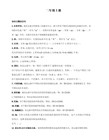
code指某一阶层或社会所遵守的一整套法典、法规或法则;也可指与某一特殊活动或主题有关的规则。
rule通常指机关、团体的规章、条例或比赛规则;也指对人行为、方法等所作的规定,还可指习俗所承认的规定。
act指经立法机构通过并由行政管理签署的法案。
eat,dine,have,consume,devour,gorge,swallow
这些动词均可表示“吃”之意。
eat普通用词,使用广泛。既可用于人,也可用于动物。
dine正式用词,既可指一日三餐中的任何一餐,也可以指特殊的用餐。
have可与eat换用,但强调一次性的动作。
consume侧重痛痛快快地吃得一干二净,可用于人和动物。
这些形容词均含“意识到的”之意。
aware强调通过耳闻目睹或感觉而得到的信息,也指敏税的观察和推断。侧重感知,多与of一起用。
conscious指内心的感觉,强调深刻的心理活动。
sensible侧重通过直觉或理性感觉意识到某物的存在
词义辨析9
agree,consent,approve,comply,subscribe
count指作出判断后而得出的看法等。
deem正式用词,常用于法律、文学,强调作判断而不是思考。
reckon指对人或事作全面“权衡”,把各方面意见考虑进去后得出结论。
regard侧重凭外表或表面现象作判断。多强调观点。
词义辨析11
considerate,thoughtful,attentive
词义辨析10
consider,think,believe,count,deem,reckon,regard
英语单词辨析
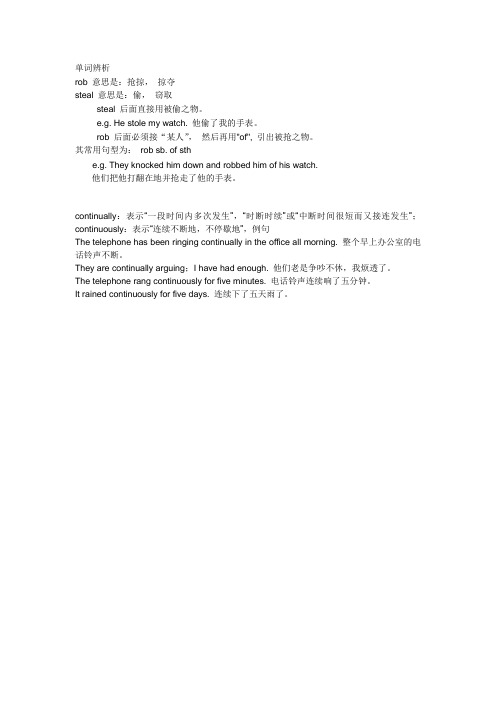
单词辨析
rob 意思是:抢掠,掠夺
steal 意思是:偷,窃取
steal 后面直接用被偷之物。
e.g. He stole my watch. 他偷了我的手表。
rob 后面必须接“某人”,然后再用"of", 引出被抢之物。
其常用句型为:rob sb. of sth
e.g. They knocked him down and robbed him of his watch.
他们把他打翻在地并抢走了他的手表。
continually:表示“一段时间内多次发生”,“时断时续”或“中断时间很短而又接连发生”;continuously:表示“连续不断地,不停歇地”,例句
The telephone has been ringing continually in the office all morning. 整个早上办公室的电话铃声不断。
They are continually arguing;I have had enough. 他们老是争吵不休,我烦透了。
The telephone rang continuously for five minutes. 电话铃声连续响了五分钟。
It rained continuously for five days. 连续下了五天雨了。
- 1、下载文档前请自行甄别文档内容的完整性,平台不提供额外的编辑、内容补充、找答案等附加服务。
- 2、"仅部分预览"的文档,不可在线预览部分如存在完整性等问题,可反馈申请退款(可完整预览的文档不适用该条件!)。
- 3、如文档侵犯您的权益,请联系客服反馈,我们会尽快为您处理(人工客服工作时间:9:00-18:30)。
单词辨析1.falling, fallenfalling 意为“正在下落的”fallen 意为“已经落地的”如:The wind blew the fallen leaves off the ground.风把落叶从地面上刮起。
2.believe, trustbelieve 意为“相信某人所说的话”trust 指相信某人的品德、为人、能力等如:I believe you.我相信你所说的话。
I trust you.我信任你。
(I believe in you.)2.can\'t, mustn\'tcan\'t 用于情态动词表推测,表示“一定不能”mustn\'t 意为“一定不要,千万不要”表“禁止”如:The man you saw at the airport cannot be T om.He is with me now.你在机场见到的那个人一定不是汤姆。
他现在和我在一起。
You mustn\'t play on the road.It\'s dangerous.你千万不要在路上玩。
太危险了。
4.famous, well-knownfamous和well-known都意为“著名的,闻名的”,二者可以通用,如:He is famous/well-known for his singing as a singer to people all over the world.但是famous后不可接从句,而well-known可以。
如:It\'s well-known that China is a developing country.众所周知,中国是一个发展中国家。
5.little, small二者均意为“小”,但是small指在客观上,数量、大小等是小的,而little则有“小而可爱的”之意。
如:a small/little bird, 但是a small test, a small number of students 6.unable, disabledunable 意为“不能的”disabled 意为“伤残的,有残疾的”如:She tried to smile but seemed unable.她试图微笑,但似乎办不到。
a disabled so ldier 伤残军人7.ashamed, shamefulashamed 意为“感到羞耻,觉得惭愧,不好意思”表示主语主观认为是可耻的。
如:He was ashamed of being unable to answer the questio n.他因为不能回答那个问题而感到羞愧。
shameful 表示事物本身的客观性质是“可耻的”如:T o steal money from a blind person is a shameful act.偷盲人的钱是可耻的行为。
8.paper, newspaperpaper 意为“纸”时是不可数名词,作“论文、试卷”解时是可数名词,在口语中可以和newspaper互换newspaper 意为“报纸”,是可数名词如:a piece of paper, a newspaper9.next, next tonext 意为“下一”next to 意为“紧挨,隔壁,仅次于,紧随其后”等如:I\'ll go abroad next year.我明年出国。
New York is the largest city next to London.纽约是仅次于伦敦的大城市。
10.affect, effect两词都有产生影响的意思,两词相应的名词又都是effect, 但两者有细微的差别。
affect作主语的词一般是物,而不是人,指一物对另一物的客观影响。
如:Smoking affects health.吸烟对健康有害。
effect指蓄意的行为(或方法)产生预期效果,目的性明确,意为“产生、招致”。
如: His deeds effected the desired result.他的行为达到了预期的效果。
11.allow, permit二者均意为“允许”,后接 sb.to do, doing,二者常通用。
但是permit不能和副词连用,而allow可以。
并且客观条件许可用permit.如:He wouldn\'t allow me in.他不愿意让我进去。
Weather permitting, we\'ll go skating.如果天气允许的话,我们就去滑冰。
12.alone, lo ne, lonelyalone=by oneself, without others 可作形容词,副词,意为“独自一人”,可作表语和宾补。
如:I happened to be alone at home.我恰好一个人在家。
lone 形容词,意为“孤独的,孤零零的一个”,做定语。
如:In that clo udy sky only one lone star could be seen.在那样的阴天里,只能看到一颗孤零零的星星。
lonely 形容词,意为“孤独的,寂寞的”表示主观上渴望有伴。
若指地方,则有“人迹罕至的,荒凉的,偏僻的”之意,可作定语或表语。
如:He was alone, but he didn\'t feel lonely.他独自一人,但并不觉得寂寞。
13.although, though二者均意为“虽然”,大部分情况下可通用,但是tho ugh可用作副词,放在句尾,although不可这样用。
如:Altho ugh/Though he is poor, he is generous.他虽然穷,但很慷慨。
=He is poor.He is generous, though. 14.always, often, usuallyalways=at all times 意为“总是”,含“毫无例外”之意。
如:He always stays at home in the evening.他晚上总是呆在家里。
often 指“经常性”的动作如:We often watch TV in the evening.我们晚上常常看电视。
usually也可指“经常”的动作,但侧重从已形成“习惯”的角度来说明动作。
如:We usually do some washing at the weekend.我们通常在周末洗衣服。
15.cap, hat二者均意为“帽,帽子”,cap通常指无沿的帽,只前方有遮沿,如便帽,军帽。
hat通常指周围有边的帽,如礼帽,草帽。
16.neither, none二者均意为“都不”,但是neither表两者都不,而none强调三者或三者以上都不。
如:None of the three boys stayed there.Neither of the two boys stayed there.17.can, may二者均意为“许可,可能”,can可用于Can I…? Can you…? 而may只能用于May I…?18.clever, bright, wiseclever 主要指“聪明,伶俐,机敏,熟练”等如:He is clever at making excuses.他善找借口。
bright 多用于指小孩的“聪明,伶俐”,也指好的建议或想法。
如:He was a bright kid.他是一个聪明的孩子。
wise 指“英明,明智,有远见”,常用于修饰伟人的远见卓识,朋友的聪颖明智如:It was wise of you to keep your mouth shut.你保持沉默是明智的。
19.condition, situationcondition 意为“条件,状况,情况”,常侧重于一定原因或条件造成的状态,如人的健康状况,物的完好程度、设备的可用性等。
如:The o ld man is in a dying condition.老人处于垂死的状态中。
situation 指某一时间由各种情况造成的“处境,形势”。
如:The present situation calls for entirely new measures.目前的形势要求采取全新的措施。
20.dangerous, in dangerdangerous 意为“危险的”是形容词,指句子的主语对别人有危害。
如:He is a dangerous man.他是一个危险人物。
in danger 意为“处于危险中”,指句子主语的处境。
如:He is in danger of losing his job.他处于失业的危险中。
21.reach, reach forreach 意为“够得到”,表结果reach for 意为“伸手去够”,表动作如:I reached for the apple on the tree, but I couldn\'t reach it.我伸手去够树上的苹果,但没够到。
22.dead, dying, deadly三者均为形容词,dead意为“死了”,表示状态;dying意为“要死了”;deadly 意为“致命的”。
如:a dead dog 一条死狗 a dying dog 一条“濒临死亡”的狗It was a deadly shock to him.这对他来说是致命的打击。
23.decide, determinedecide 指经过考虑或讨论研究作出决定,后接不定式、介词on/upon+(动)名词或从句。
如:It has been decided that museum shall not be open on Saturday.经决定博物馆星期六不开放。
determine 意为“决心,坚决”,后接不定式,侧重于表示决心已下,任何力量都动摇不了,还可接on/upon+动名词。
如:I determined to give him a chance.我决定给他一次机会。
24.demand, request, requiredemand 主语是人时,表示坚决要求,坚持要做某事;主语是物时,指迫切需要。
如:The workers are demanding better pay.工人们要求提高工资。
request 意为“恳求,请求”,指通过正式手续提出的要求,口气和缓,态度礼貌。
如:You\'re kindly requested to fasten your seatbelts.请各位系好安全带。
require 表示按照法规、权利提出的要求或命令,指客观需要,含“缺此不可”之意。
如:I\'ve done all that is required by the contract.我履行了合同所要求的每一件事。
